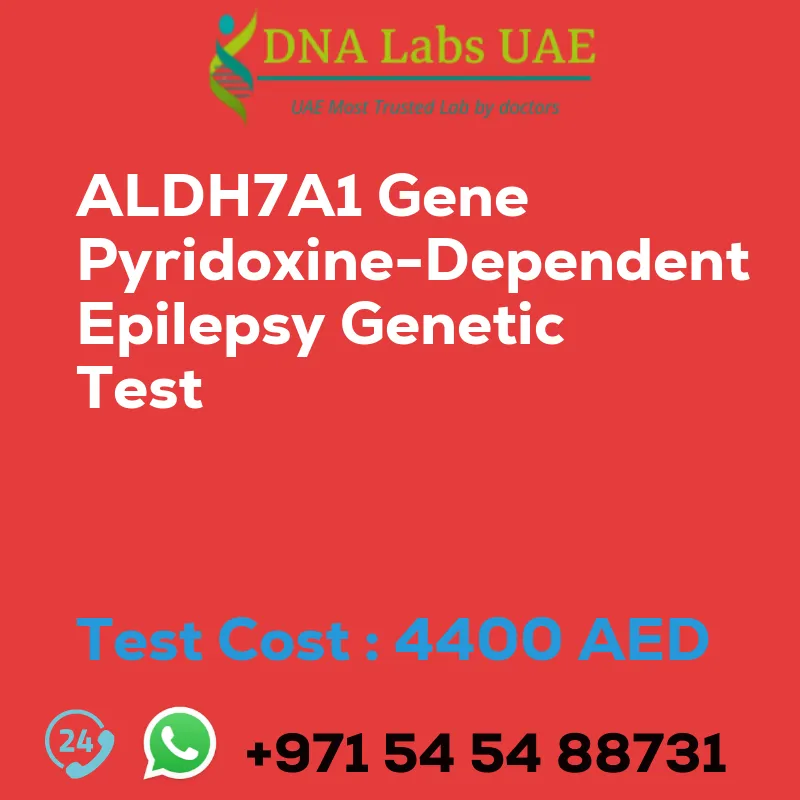
The CALR gene, known for its role in the endoplasmic reticulum's calcium homeostasis and protein folding, has been a subject of interest in the study of schizophrenia. Research has suggested that mutations or alterations in the CALR gene may contribute to the development of schizophrenia, a complex mental disorder characterized by disruptions in thought processes, perceptions, emotional responsiveness, and social interactions.
DNA Labs UAE offers a specialized genetic test aimed at identifying variations in the CALR gene that may be linked to an increased risk of schizophrenia. This test is a valuable tool for individuals with a family history of schizophrenia or those exhibiting early symptoms of the disorder. By analyzing specific markers within the CALR gene, the test can provide insights into an individual's genetic predisposition to schizophrenia, enabling early intervention and personalized treatment strategies.
The cost of the CALR-related genetic test at DNA Labs UAE is 4400 AED. The test is conducted under the guidance of genetic experts and utilizes advanced genetic sequencing technology to ensure accurate and reliable results. Upon completion, a comprehensive report is provided, detailing the findings and offering recommendations for follow-up care or preventive measures if necessary.
This genetic test represents a significant step forward in the personalized medicine approach to managing schizophrenia, offering hope for better outcomes through targeted interventions based on an individual's genetic makeup.

The CELSR2 gene, located on chromosome 1, has been implicated in various biological processes crucial for normal brain function. Recent studies suggest a potential link between genetic variations in CELSR2 and the development of schizophrenia, a complex psychiatric disorder characterized by disturbances in thought, perception, and behavior. This connection has paved the way for the development of genetic tests aimed at identifying individuals at increased risk based on their CELSR2 gene profile.
DNA Labs UAE offers a specialized genetic test focused on the CELSR2 gene to assess the risk of developing schizophrenia. This test is particularly valuable for individuals with a family history of psychiatric disorders or those exhibiting early symptoms of schizophrenia. By analyzing specific markers within the CELSR2 gene, the test can provide insights into one's genetic predisposition to the disorder.
The cost of the CELSR2-related genetic test at DNA Labs UAE is 4400 AED. The test involves a simple and non-invasive procedure, typically requiring only a saliva or blood sample. Results are usually available within a few weeks and are presented in a comprehensive report. It is important for individuals undergoing this test to consult with healthcare professionals or genetic counselors to fully understand the implications of their results and explore potential preventive or therapeutic strategies.

The GRID2 gene, associated with glutamate receptor signaling pathways, has garnered attention for its potential link to schizophrenia, a complex psychiatric disorder characterized by symptoms such as hallucinations, delusions, and cognitive impairments. Variations or mutations in the GRID2 gene may influence the development or severity of schizophrenia by affecting glutamate signaling, which is crucial for normal brain function and neural communication.
DNA Labs UAE offers a specialized genetic test designed to identify variations in the GRID2 gene that may be related to an increased risk of developing schizophrenia. This test is a valuable tool for individuals with a family history of schizophrenia or those exhibiting early symptoms of the disorder. By understanding one's genetic predisposition, it is possible to take proactive steps in managing the condition, including early intervention and personalized treatment plans.
The test is priced at 4400 AED, reflecting the sophisticated technology and expertise required to accurately analyze genetic material and interpret the results. Conducted in a state-of-the-art laboratory by experienced professionals, the test involves collecting a DNA sample, usually through a simple and non-invasive method such as a cheek swab or blood draw. After the sample is processed and analyzed, a comprehensive report is provided, detailing any detected variations in the GRID2 gene and offering guidance on the implications for schizophrenia risk.
In summary, the GRID2 Related Genetic Test offered by DNA Labs UAE is a cutting-edge diagnostic tool that plays a crucial role in understanding the genetic factors contributing to schizophrenia. With its reasonable cost of 4400 AED, this test represents a significant step forward in personalized medicine, offering individuals valuable insights into their mental health and fostering a proactive approach to managing their well-being.

The NOTCH4 gene, located on chromosome 6, has been implicated in the development of schizophrenia, a complex mental health disorder characterized by symptoms such as hallucinations, delusions, and impaired cognitive functions. Research suggests that variations in the NOTCH4 gene may influence the risk of developing schizophrenia, making it a significant area of study for understanding the genetic underpinnings of this condition.
DNA Labs UAE offers a specialized genetic test focused on the NOTCH4 gene to assess the risk of schizophrenia. This test is designed to detect specific mutations or variations in the NOTCH4 gene that are associated with an increased risk of developing schizophrenia. By analyzing a patient's DNA sample, usually collected through a simple blood draw or cheek swab, the test can provide valuable insights into the individual's genetic predisposition to schizophrenia.
The cost of the NOTCH4 related genetic test at DNA Labs UAE is 4400 AED. This test is a crucial tool for individuals with a family history of schizophrenia or those who exhibit early signs of the disorder, as it can help in early diagnosis and management. Understanding one's genetic risk can also aid in personalized treatment planning, potentially improving outcomes for those affected by schizophrenia.
It's important for individuals considering this test to consult with healthcare professionals or genetic counselors to understand the implications of the results and how they can be integrated into a comprehensive approach to managing or mitigating the risk of schizophrenia.

The HSPG2 Gene Schwartz-Jampel Syndrome Type 1 Genetic Test is a specialized diagnostic procedure offered by DNA Labs UAE, designed to identify mutations in the HSPG2 gene, which are associated with Schwartz-Jampel Syndrome Type 1 (SJS1). Schwartz-Jampel Syndrome is a rare genetic disorder characterized by muscle stiffness and abnormalities in bone development, leading to a distinctive facial appearance, among other symptoms. The condition is inherited in an autosomal recessive manner, meaning that an individual must inherit two copies of the mutated gene, one from each parent, to be affected.
This genetic test involves analyzing the patient's DNA, extracted from a blood sample, to detect mutations in the HSPG2 gene that are indicative of SJS1. The identification of specific gene mutations can confirm a diagnosis, allowing for tailored management and treatment plans for the affected individuals. Moreover, the test can provide essential information for family planning and genetic counseling for families with a history of the syndrome.
The test is priced at 4400 AED and is conducted in the state-of-the-art facilities of DNA Labs UAE, ensuring high accuracy and reliability of the results. By opting for this test, individuals suspected of having Schwartz-Jampel Syndrome Type 1, or families with a known history of the condition, can gain valuable insights into their genetic status, aiding in the early detection and management of the syndrome.

The "TH Gene Segawa Syndrome Autosomal Recessive Genetic Test" is a specialized diagnostic examination offered by DNA Labs UAE, designed to detect mutations in the TH gene, which are responsible for Segawa syndrome. Segawa syndrome, also known as Dopa-responsive dystonia (DRD), is a rare genetic disorder characterized by dystonia, tremors, and progressive difficulty in walking. This condition is autosomal recessive, meaning that an individual must inherit two copies of the mutated gene, one from each parent, to be affected.
The test specifically targets the TH gene to identify any genetic abnormalities that may lead to the development of Segawa syndrome. Early diagnosis through this genetic testing is crucial for effective management of the syndrome, as it can significantly improve the quality of life of those affected through timely interventions, including pharmacological treatment.
DNA Labs UAE offers this comprehensive genetic test at a cost of 4400 AED. The test involves collecting a DNA sample from the patient, usually through a blood draw or a cheek swab, which is then analyzed in the laboratory for the presence of mutations in the TH gene. The results from this test can provide valuable information for affected individuals and their families regarding the diagnosis, prognosis, and potential treatment options for Segawa syndrome, facilitating informed decisions about their health care.

The PRRT2 gene is associated with benign familial infantile seizures type 2, a condition characterized by early-onset seizures that typically manifest in infancy or early childhood. These seizures are usually brief and tend to resolve by the age of 2 to 4 years. The condition is inherited in an autosomal dominant manner, meaning a mutation in just one of the two copies of the gene can cause the disorder.
Genetic testing for mutations in the PRRT2 gene is crucial for accurate diagnosis and management of the condition. It helps in distinguishing benign familial infantile seizures from other types of epilepsy that may require different treatment approaches. Early and precise diagnosis can also provide valuable information for family planning and genetic counseling.
DNA Labs UAE offers a genetic test specifically designed to detect mutations in the PRRT2 gene. The test is conducted using a blood sample, and the process involves analyzing the genetic material to identify any alterations in the PRRT2 gene that are known to cause benign familial infantile seizures type 2.
The cost of the PRRT2 gene test at DNA Labs UAE is 4400 AED. This investment in genetic testing can be pivotal for families seeking answers to their child's seizure disorder, enabling them to access targeted treatment and support, and to understand the risk for future children or other family members.

The "KCNQ2 Gene Seizures Benign Neonatal Type 1 Genetic Test" is a specialized diagnostic examination conducted to identify mutations in the KCNQ2 gene, which are associated with benign neonatal seizures type 1 (BFNS1). This condition typically manifests within the first days to weeks of life, presenting as seizures that usually resolve by 12 months of age. The genetic basis of this disorder means that it can run in families, making genetic testing crucial for accurate diagnosis and family planning.
Performed at DNA Labs UAE, this test involves analyzing the patient's DNA to detect any abnormalities in the KCNQ2 gene that may lead to the development of benign neonatal seizures. The process is non-invasive, requiring only a sample of blood or saliva from the patient. The cost of the test is 4400 AED, reflecting the specialized nature of the examination and the comprehensive analysis it entails.
By confirming the presence of a KCNQ2 mutation, the test not only aids in diagnosing the condition but also helps in managing the patient's treatment plan more effectively. Additionally, it provides valuable information for family members who may be at risk of passing the mutation to future generations.

The ALDH7A1 gene pyridoxine-dependent epilepsy genetic test is a specialized diagnostic tool used to identify mutations in the ALDH7A1 gene, which are associated with pyridoxine-dependent epilepsy (PDE). PDE is a rare, genetic disorder characterized by seizures that are not controllable with usual antiepileptic drugs but can be effectively managed with daily doses of pyridoxine (vitamin B6). Early diagnosis and treatment are crucial to prevent neurological damage and improve patient outcomes.
This genetic test is conducted by extracting DNA from a blood sample and analyzing the ALDH7A1 gene for specific mutations known to cause PDE. The process involves sophisticated laboratory techniques to ensure accurate detection of genetic abnormalities.
The cost of the ALDH7A1 gene pyridoxine-dependent epilepsy genetic test is 4400 AED. The test is available at DNA Labs UAE, a reputable laboratory known for its advanced genetic testing services. DNA Labs UAE employs state-of-the-art technology and adheres to stringent quality control measures to provide reliable and precise test results, making it a trusted choice for patients and healthcare providers seeking genetic testing for pyridoxine-dependent epilepsy.

The "CLCN4 Gene Raynaud-Claes Syndrome Genetic Test" is a specialized diagnostic procedure aimed at detecting mutations in the CLCN4 gene, which have been linked to Raynaud-Claes Syndrome. This condition is a rare genetic disorder that can affect various systems in the body, leading to symptoms such as developmental delays, neurological issues, and sometimes physical deformities. The test is conducted through a detailed analysis of the patient's DNA, specifically targeting the CLCN4 gene to identify any abnormalities or mutations that might be responsible for the syndrome.
Performed at DNA Labs UAE, a leading facility in genetic testing and analysis, this test offers families and individuals the chance to understand their genetic makeup concerning Raynaud-Claes Syndrome, allowing for informed medical and personal decisions. The cost of the test is set at 4400 AED, reflecting the comprehensive nature of the analysis and the specialized expertise required to interpret the results. By opting for this test, patients and their healthcare providers can gain valuable insights into the genetic underpinnings of the condition, facilitating targeted interventions and management strategies to improve the quality of life for those affected.














